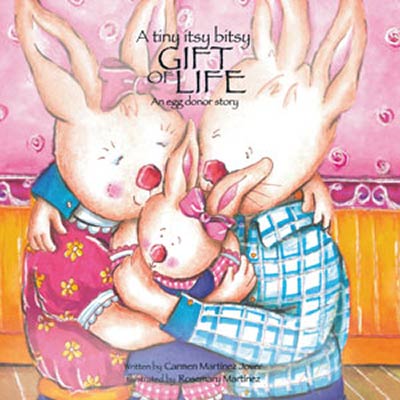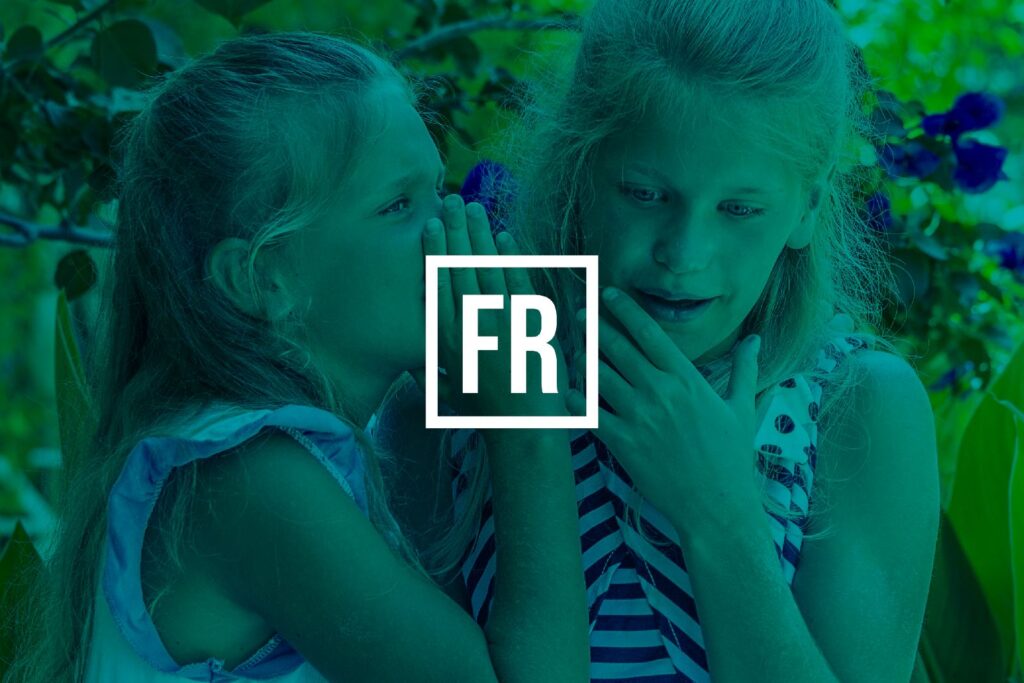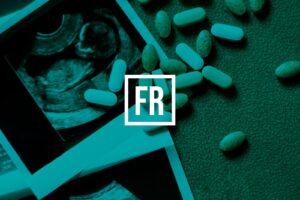Fertility Road: Carmen, thank you so much for sharing your expertise on this topic. What would you suggest as a starting point for parents of a donor-conceived child? How can they best start preparing themselves to share the truth with their child?
Carmen: Often, there is a long string of failed pregnancies, in-vitro’s, negative beta results, loss, frustration, emotions, wondering why this is happening to me, before actually becoming a parent of a donor-conceived child. The journey to parenthood involves so many challenges. For many, this involves not being able to conceive naturally, then perhaps going into IVF treatment, followed by the need to consider egg and/or sperm donation. The journey can be a rough ride to finally become parents to a beautiful baby. At last, you have your baby in your arms. There is so much love it blows your mind. There is this beautiful romance. The mere thought of sharing the truth causes a fear of breaking the spell and connecting to all the pain prior to the bliss.
As a starting point, I would suggest working on the parents’ individual fears. Mourning the journey prior to becoming a parent, letting go of the past. Recognizing what they have gone through and taking time to honor it and accept it. Letting go of the grief of not having been able to conceive with their own egg and/or sperm. It is common for parents to feel uneasy about sharing the truth and breaking this romance. The journey prior to having their baby was paved with much disappointment and it is only natural they should try to protect themselves, thus fearing the risk of making the wrong decision. However, working on their fears and verbalizing their thoughts helps them to feel proud of the way their family was formed and gives them the courage to share the truth with their child.
Fertility Road: In your experience as a fertility coach, do parents of donor-conceived children tend to harbor fear of other adults’ opinions? What can they do to alleviate their fears of others’ opinions?
Carmen: In today’s society there is not enough knowledge and information about donor-conceived children. For parents of a donor-conceived child, they are in a different position than most families and therefore need to be informed on how to share the facts.
Gathering knowledge, talking to other parents who are going through a similar process, contacting them and sharing your experiences will give you the support needed. You will realize they have the same doubts as you and it will help alleviate your fears. As humans, we like to be accepted and fear rejection. We don’t want our children to be perceived as different. But we often let others’ opinions affect us in other areas of our lives. Sometimes fearing others’ opinion is what triggers our fear of sharing with our child and being seen as different. Fear of the grandparents behaving differently with their donor-conceived children. Fear of children and teachers at school treating our children differently. But as long as you are confident and teach your child to feel proud, he/she will have the tools needed to face others’ opinions.
If we look back 30 years, adoption was considered taboo. Often, whole families knew about an adoption except the adopted child. Nowadays, it is very different and much more open. 30 years ago, living with your partner before marriage was frowned upon but now it is highly recommended to see if things will work out. So, society takes time in assimilating new concepts.
Considering that society takes time in opening up to these new forms of families, I wrote a children’s story titled Recipes of How Babies are Made. I thought that by informing children, it is possible to shorten the time society takes to accept and feel comfortable with these modern families.
So, you are part of this change to open society to these modern families. It is the simplicity of it and the honesty that you will find comforting. Empowering yourself with knowledge. Remember that thanks to the donation you have your family. That is priceless. Start working on yourself and getting yourself into the right mindset, addressing your fears of other people’s opinions.
Fertility Road: Why is it so important for parents of donor-conceived children to share the truth of their origins?
Carmen: The more the years go by, the harder it seems for a parent to find the correct moment to share the truth. But deep down inside one is avoiding this moment for fear of not knowing how to deal with it. Sometimes one thinks that by not sharing the truth we are protecting our child because we assume that the information will hurt him/her, but the truth can come to the surface when you least expect it.
There are benefits to sharing the truth. For example, what happens if you have a genetic condition? Your child might fear having the same condition when that is not actually biologically possible. What happens if your daughter has the same issues as you in getting pregnant? Wouldn’t it be lovely to support her knowing that you were in the same situation and can shed light on the subject? I believe truth is an important family value. Creating a space where everyone can speak freely and feel supported is essential in all families at all times.

Fertility Road: When is the ideal age for parents to start the conversation with a donor-conceived child?
Carmen: Since 2005, I have been following Susan Golombov, a pioneer studying modern families created by assisted reproductive technologies. She has studied the psychological effects of such children when growing up and the parental influences. I admire her life’s work greatly. In her book, Modern Families, you can see her entire research and results. She recommends that the best age to disclose the truth is before starting school. I believe it’s a book that should be read by all parents of donor-conceived children and by all modern families to understand the pros and cons of sharing the truth at different ages.
By 2005, I had spent many years helping adoptive parents tell their children how their families were formed and I was invited to participate in a conference in India on how to share information with donor-conceived children. There wasn’t that much information at that time, so I began doing research and based on the information of Susan Golombov I wrote my first children’s story on sharing egg donation, A Tiny Itsy Bitsy Gift of Life, an egg donor story.
I believe that the best time to start sharing is when they are babies. First, you must work on yourself to start feeling comfortable with the idea of sharing the facts. Babies absorb everything, they start their programing at a subconscious level. Even as far back as the womb. Their brain levels are in Gamma and Theta and are open to all our beliefs. You might think they don’t understand, but they do. They grow up with the notion and then it’s as though they always knew, and sharing the information little by little as they grow becomes easier. Speak openly about the subject at home.
Fertility Road: How should parents go about telling their child that they were conceived with the help of a donor?
Carmen: Firstly, as I always say, they need to work on themselves and feel proud of how their family was formed. Then they can start reading an egg donor story to them when they are babies. One becomes familiar with the book. It is important to have the book handy and available so it is read often.
There are many stories on donor conception that you can read often. Very probably one story, in particular, will make you feel more comfortable. By reading to them, your children become aware of donor conception in their own understanding levels as they grow. You can start by saying, “Our family was formed this way”. “I am so proud of how our family was formed.”
When the stories are personalized the characters have your names, so you are sharing how your very own family was formed, and when the children are old enough to understand the process, they will already be familiar with the book and have had it for many years.
When you read the book smile, your child will immediately identify that this book makes my parents smile. As you read help them visualize the drawings. Make if a fun activity.
Gradually, as your child grows older it becomes easier to share. Always listen to your heart and you will know when it is time to share a bit more. But always keep the intention of sharing in mind.
Fertility Road: What inspired you to write a range of books on new-age conception and infertility?
Carmen: I passionately believe in storytelling. I used a children’s story to tell my daughter that she was adopted. That was 22 years ago and there were many books on adoption, which made sharing so easy.
I would start reading to her as a baby and when I finished reading, I would cry thinking how the information might hurt her when she could fully understand. However, what I was actually doing was working on myself and building my confidence for future sharing. As she grew older and understood more it seemed easier to share. The adoption books were everywhere, in the nappy bag, in the playroom, and she got to really like a book in particular. The book became special and we would smile while reading the book, she knew it by heart. I believe every child has the right to understand how their family was formed. Storytelling is such a simple tool to use. This led me to write stories for families conceived via egg donation, sperm donation, two dads, adoption, single mum by choice, and I still continue writing stories for all the different families of modern society.
I constantly receive letters from families saying how my stories have helped and this motivates me to continue writing more.
Fertility Road: How can parents continue to keep the conversation open with their child? How can they create a safe space so that their child knows that it’s ok for them to ask more questions in the future?
Carmen: This safe place will be created according to the way we create openness for our children on a day-to-day basis. This is done by creating an atmosphere of trust at home. A family dynamic where all feel comfortable in sharing everyday situations. If bigger issues occur, they are dealt with in a loving and open manner. Maintaining openness at home helps your child share his/her way of processing experiences and normalizing the fact that they are donor-conceived. Speak their language of comprehension and tune into their level of understanding as they grow older. As I have mentioned before, trust the process and listen to your heart.
Fertility Road: How can parents of a donor-conceived child best prepare themselves if their child wishes to access information on their donor in the future? How can they support their child in their curiosity?
Carmen: This is quite a delicate subject and one of the principal fears in sharing the truth. What happens if the donor-conceived child wants information on the donor? Notice it’s a donor not a biological parent. You are the parent. But this fear is very common. Talking to others, reading statistics and getting information will give you peace of mind on this subject. Remember, the way you feel on this subject will be passed on to your child. Some children are curious, others aren’t. Some become very concerned but it is important to keep speaking the truth and making sure they feel supported by you. In some countries at the age of 18, they can legally get the information from their files. In other countries it is anonymous so access to this information varies from country to country.
As parents, there is often concern about them wanting to know who the donors are. But I believe it is more of a curiosity. You are their parent and you should feel confident and support them. Understand that each child is different. Children go through an identity phase, they want to fit in, and sometimes they want to access information on the donor. As they grow, the relationship between you and your child will also grow and you will know what to do. Always listen to your heart and you will know how to support them.






